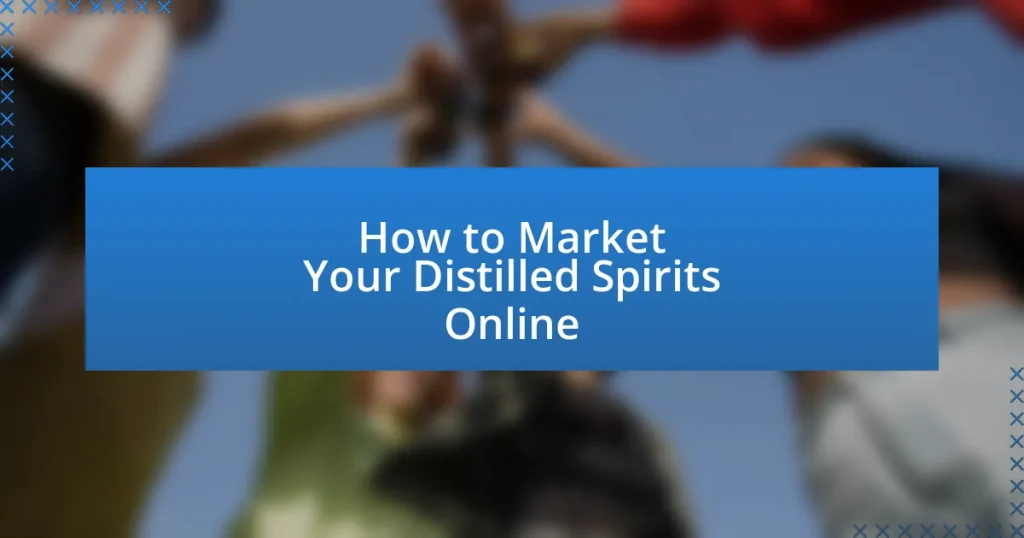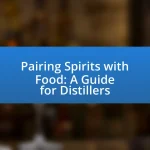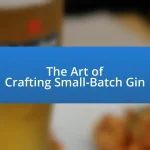The article focuses on effective strategies for marketing distilled spirits online, emphasizing the importance of social media, e-commerce optimization, and email marketing. Key strategies include leveraging targeted advertising on platforms like Instagram and Facebook, enhancing website usability to reduce cart abandonment, and utilizing personalized email campaigns to nurture customer relationships. The article also addresses the role of storytelling, community engagement, and compliance with legal regulations in building brand loyalty and ensuring responsible marketing practices. Additionally, it highlights the challenges faced in the competitive online spirits market and offers practical tips for improving marketing efforts.
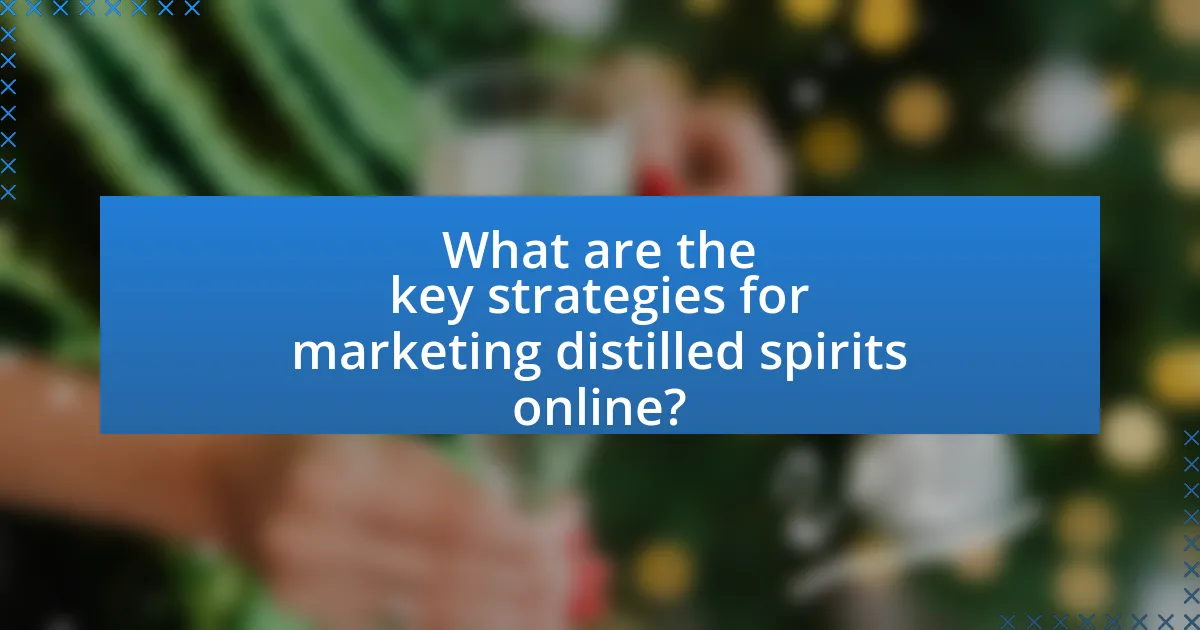
What are the key strategies for marketing distilled spirits online?
The key strategies for marketing distilled spirits online include leveraging social media platforms, optimizing e-commerce websites, and utilizing email marketing campaigns. Social media platforms like Instagram and Facebook allow brands to engage with consumers through visually appealing content and targeted advertising, which can increase brand awareness and drive sales. Optimizing e-commerce websites ensures a seamless shopping experience, which is crucial for converting visitors into customers; statistics show that 70% of consumers abandon their carts due to poor website usability. Email marketing campaigns can effectively nurture customer relationships and promote new products or special offers, with studies indicating that email marketing has an average ROI of $42 for every dollar spent.
How can social media platforms enhance the marketing of distilled spirits?
Social media platforms can enhance the marketing of distilled spirits by providing targeted advertising, engaging content, and community building. These platforms allow brands to reach specific demographics through tailored ads, increasing the likelihood of conversion. For instance, Facebook and Instagram offer advanced targeting options based on user interests and behaviors, which can effectively connect distilled spirit brands with potential consumers. Additionally, engaging content such as cocktail recipes, brand stories, and user-generated content fosters interaction and loyalty among followers. According to a study by Nielsen, 92% of consumers trust recommendations from friends and family over any other form of advertising, highlighting the importance of community engagement on social media. Furthermore, platforms like Instagram and TikTok enable brands to showcase their products visually, appealing to the aesthetic preferences of younger consumers, which is crucial in the spirits market where presentation matters.
What types of content should be shared on social media for distilled spirits?
Engaging content types for social media marketing of distilled spirits include cocktail recipes, brand storytelling, educational posts about the distillation process, user-generated content, and promotional events. Cocktail recipes attract consumers by showcasing versatility and encouraging experimentation with the product. Brand storytelling fosters emotional connections, highlighting the heritage and craftsmanship behind the spirits. Educational posts inform audiences about the distillation process, enhancing appreciation for the product. User-generated content, such as customer photos and reviews, builds community and trust. Promotional events, including tastings and contests, drive engagement and increase brand visibility. These content types effectively resonate with target audiences, enhancing brand loyalty and driving sales.
How can engagement with followers improve brand loyalty?
Engagement with followers enhances brand loyalty by fostering a sense of community and connection. When brands actively interact with their audience through social media, personalized responses, and engaging content, they create an emotional bond that encourages repeat purchases. Research indicates that 70% of consumers are more likely to recommend a brand after a positive interaction on social media, demonstrating the direct correlation between engagement and loyalty. Additionally, brands that engage with their followers can gather valuable feedback, allowing them to tailor their offerings to meet customer preferences, further solidifying loyalty.
What role does a website play in marketing distilled spirits?
A website serves as a central hub for marketing distilled spirits by providing essential information, engaging content, and facilitating direct consumer interaction. It allows brands to showcase their products, share their story, and educate consumers about the distillation process, which can enhance brand loyalty and recognition. According to a study by the Distilled Spirits Council, 70% of consumers research products online before making a purchase, highlighting the importance of a well-structured website in influencing buying decisions. Additionally, a website can integrate e-commerce capabilities, enabling direct sales and expanding market reach, which is crucial in a competitive industry.
How can SEO optimize a distilled spirits website for better visibility?
SEO can optimize a distilled spirits website for better visibility by implementing targeted keyword strategies, enhancing on-page content, and improving site structure. Targeted keyword strategies involve researching and integrating relevant terms that potential customers use when searching for distilled spirits, which can increase organic search traffic. Enhancing on-page content includes creating informative and engaging articles about the products, distillation processes, and cocktail recipes, which can improve user engagement and dwell time. Improving site structure involves ensuring fast loading times, mobile optimization, and easy navigation, which are critical factors for search engine rankings. According to a study by Moz, 70% of marketers see SEO as more effective than PPC for generating sales, highlighting the importance of these strategies in increasing visibility.
What essential features should a distilled spirits website include?
A distilled spirits website should include essential features such as an engaging product catalog, detailed product descriptions, user-friendly navigation, and e-commerce functionality. An engaging product catalog allows customers to browse various spirits easily, while detailed product descriptions provide information on flavor profiles, production methods, and pairing suggestions, enhancing the customer experience. User-friendly navigation ensures that visitors can find information quickly, which is crucial for retaining potential buyers. E-commerce functionality enables direct purchases, streamlining the buying process. According to a study by the National Restaurant Association, 70% of consumers prefer to order online, highlighting the importance of e-commerce capabilities for distilled spirits websites.
How can email marketing be utilized for distilled spirits promotion?
Email marketing can be utilized for distilled spirits promotion by creating targeted campaigns that engage consumers with personalized content, exclusive offers, and educational material about the products. Distilled spirits brands can segment their email lists based on customer preferences, purchase history, and demographics to tailor messages that resonate with specific audiences. For instance, sending cocktail recipes featuring a particular spirit can enhance customer engagement and encourage product trials. According to a study by the Direct Marketing Association, email marketing has an average return on investment of $42 for every dollar spent, highlighting its effectiveness in driving sales and brand loyalty in the spirits industry.
What types of email campaigns are most effective for distilled spirits?
Promotional email campaigns featuring limited-time offers and exclusive discounts are the most effective for distilled spirits. These campaigns create a sense of urgency and encourage immediate purchases, which is supported by data indicating that time-sensitive promotions can increase conversion rates by up to 30%. Additionally, storytelling campaigns that highlight the brand’s heritage and craftsmanship resonate well with consumers, fostering brand loyalty and engagement. Research shows that brands that effectively communicate their unique narratives see a 20% increase in customer retention.
How can segmentation improve email marketing results?
Segmentation can significantly improve email marketing results by allowing marketers to tailor content to specific audience groups, thereby increasing engagement and conversion rates. By dividing a customer base into distinct segments based on demographics, behaviors, or preferences, marketers can send targeted messages that resonate more effectively with each group. For instance, a study by Mailchimp found that segmented campaigns had an open rate of 14.32% compared to 11.4% for non-segmented campaigns, demonstrating that targeted messaging leads to higher engagement. This targeted approach not only enhances customer satisfaction but also drives sales, as personalized emails are known to generate six times higher transaction rates than non-personalized ones.
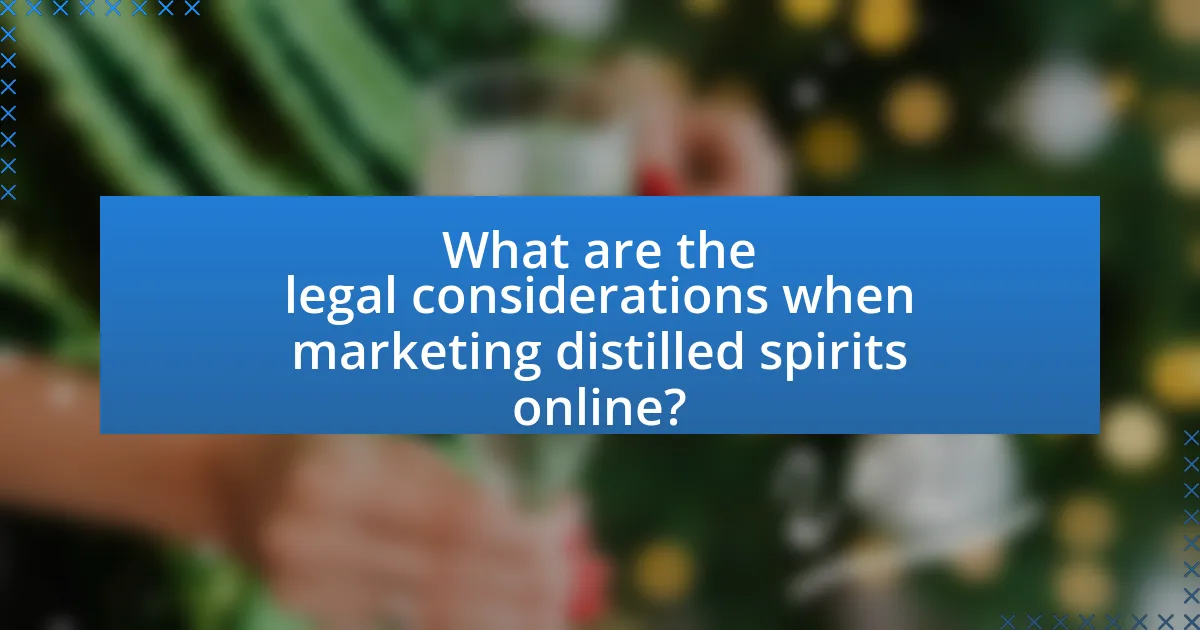
What are the legal considerations when marketing distilled spirits online?
When marketing distilled spirits online, businesses must comply with federal, state, and local laws governing alcohol advertising and sales. The Alcohol and Tobacco Tax and Trade Bureau (TTB) regulates advertising to ensure it is not misleading and does not promote excessive consumption. Additionally, marketers must adhere to age verification requirements to prevent underage access, as many states mandate that online sales only target consumers of legal drinking age. Furthermore, some jurisdictions impose restrictions on the types of promotional content that can be used, such as prohibiting the depiction of drinking in a manner that encourages irresponsible behavior. Compliance with these regulations is essential to avoid legal penalties and maintain a reputable brand image.
What regulations must be followed in online marketing of distilled spirits?
Online marketing of distilled spirits must comply with federal, state, and local regulations, including the Alcohol and Tobacco Tax and Trade Bureau (TTB) guidelines, which prohibit misleading advertising and require accurate labeling. Additionally, marketers must adhere to age verification laws to ensure that only individuals of legal drinking age can access promotional content. The Federal Trade Commission (FTC) also mandates that advertisements must not be deceptive or unfair, reinforcing the need for transparency in marketing practices. These regulations are crucial to maintain compliance and avoid legal repercussions in the promotion of distilled spirits online.
How do age restrictions impact marketing strategies?
Age restrictions significantly influence marketing strategies by limiting the target audience for distilled spirits. Marketers must ensure that their campaigns comply with legal age requirements, which often necessitates age-gating on websites and social media platforms to prevent underage access. For instance, the Alcohol and Tobacco Tax and Trade Bureau (TTB) mandates that advertising for alcoholic beverages must not appeal to minors, compelling brands to focus on messaging that resonates with adults aged 21 and older. This regulatory framework shapes content creation, advertising channels, and promotional tactics, as marketers often leverage platforms frequented by older demographics, such as Facebook and LinkedIn, rather than those popular with younger users. Consequently, age restrictions necessitate a more targeted and compliant approach to marketing, ensuring that campaigns effectively reach and engage the legally permitted audience while adhering to industry regulations.
What are the consequences of non-compliance with alcohol marketing laws?
Non-compliance with alcohol marketing laws can result in severe legal and financial consequences for businesses. These consequences include hefty fines, which can range from thousands to millions of dollars depending on the severity of the violation, and potential criminal charges against responsible individuals. Additionally, businesses may face the suspension or revocation of their licenses to sell alcohol, leading to significant operational disruptions. For instance, the Federal Trade Commission and the Alcohol and Tobacco Tax and Trade Bureau enforce regulations that, if violated, can lead to investigations and penalties. Furthermore, non-compliance can damage a brand’s reputation, leading to loss of consumer trust and decreased sales.
How can brands ensure responsible marketing practices?
Brands can ensure responsible marketing practices by adhering to ethical guidelines, promoting transparency, and prioritizing consumer welfare. Implementing industry standards, such as those set by the Distilled Spirits Council of the United States, helps brands avoid misleading claims and ensures that marketing messages are appropriate for the target audience. Additionally, brands should engage in regular audits of their marketing strategies to assess compliance with legal regulations and ethical norms, thereby fostering trust and accountability. Research indicates that responsible marketing not only enhances brand reputation but also contributes to long-term customer loyalty, as consumers increasingly favor brands that demonstrate social responsibility.
What guidelines should be followed to promote responsible drinking?
To promote responsible drinking, guidelines include setting a legal drinking age, encouraging moderation, and providing clear information about alcohol content. Research indicates that countries with strict legal drinking ages, such as the United States, have lower rates of underage drinking, demonstrating the effectiveness of this guideline. Additionally, campaigns that promote moderation, like the “Drink Responsibly” initiatives, have shown to reduce binge drinking behaviors. Clear labeling of alcohol content helps consumers make informed choices, as studies reveal that awareness of alcohol levels correlates with responsible consumption.
How can partnerships with organizations promote responsible consumption?
Partnerships with organizations can promote responsible consumption by leveraging their influence and resources to create awareness and educational campaigns. For instance, collaborations with health organizations can disseminate information about the effects of excessive alcohol consumption, thereby encouraging moderation. Research from the National Institute on Alcohol Abuse and Alcoholism indicates that educational initiatives can significantly reduce risky drinking behaviors. Additionally, partnerships can facilitate community events that promote responsible drinking practices, further reinforcing positive consumer behavior.
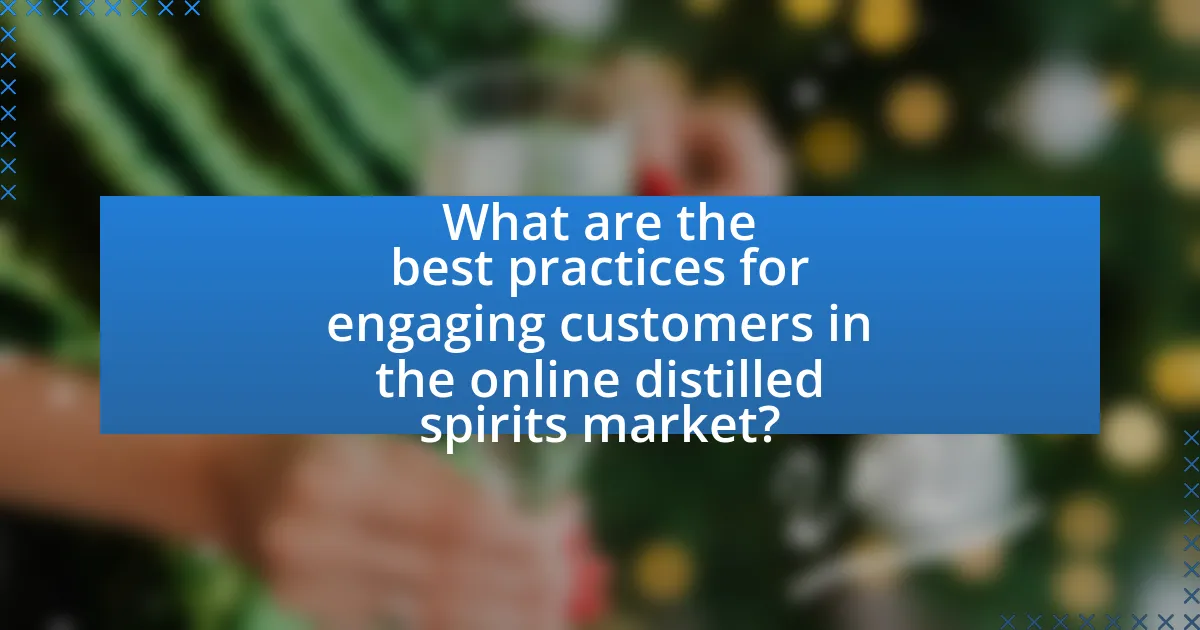
What are the best practices for engaging customers in the online distilled spirits market?
The best practices for engaging customers in the online distilled spirits market include utilizing targeted digital marketing strategies, offering personalized experiences, and leveraging social media platforms. Targeted digital marketing strategies, such as search engine optimization (SEO) and pay-per-click advertising, help reach specific demographics interested in distilled spirits, increasing visibility and engagement. Personalized experiences, such as tailored recommendations based on customer preferences and purchase history, enhance customer satisfaction and loyalty. Leveraging social media platforms allows brands to interact directly with consumers, share engaging content, and build community around their products, which is crucial in a competitive market. According to a study by the Distilled Spirits Council, brands that actively engage with customers on social media see a 30% increase in customer retention rates.
How can storytelling enhance the marketing of distilled spirits?
Storytelling can enhance the marketing of distilled spirits by creating an emotional connection between the brand and consumers. This connection fosters brand loyalty and differentiates products in a competitive market. For instance, brands that share their heritage, production methods, or unique ingredients can engage consumers on a deeper level, making the product more memorable. Research indicates that storytelling can increase consumer engagement by up to 22 times, as narratives resonate more than mere facts. By leveraging storytelling, distilled spirits brands can effectively communicate their values and history, ultimately driving sales and customer retention.
What elements make a compelling brand story for distilled spirits?
A compelling brand story for distilled spirits includes authenticity, heritage, emotional connection, and unique selling propositions. Authenticity establishes trust, as consumers are drawn to brands that reflect genuine values and practices. Heritage highlights the brand’s history, often rooted in traditional methods or local ingredients, which can enhance its appeal; for example, many successful distilleries emphasize their artisanal techniques passed down through generations. Emotional connection engages consumers on a personal level, often through storytelling that resonates with their experiences or aspirations. Unique selling propositions differentiate the brand from competitors, showcasing what makes it special, such as innovative flavors or sustainable practices. Together, these elements create a narrative that captivates consumers and fosters brand loyalty.
How can customer testimonials be effectively used in marketing?
Customer testimonials can be effectively used in marketing by showcasing authentic experiences that build trust and credibility with potential buyers. When distilled spirits brands feature testimonials prominently on their websites and social media platforms, they can influence purchasing decisions; studies show that 79% of consumers trust online reviews as much as personal recommendations. Additionally, using testimonials in targeted advertising campaigns can enhance engagement, as personalized content resonates more with audiences. By integrating real customer feedback into marketing strategies, brands can create a relatable narrative that highlights product quality and customer satisfaction, ultimately driving sales and brand loyalty.
What innovative marketing techniques can be applied to distilled spirits?
Innovative marketing techniques for distilled spirits include leveraging social media influencers, utilizing augmented reality (AR) experiences, and implementing personalized marketing strategies. Social media influencers can effectively reach target demographics, as studies show that 49% of consumers depend on influencer recommendations. Augmented reality can enhance consumer engagement by allowing users to interact with products through their smartphones, creating immersive experiences that can increase brand loyalty. Personalized marketing, which tailors messages based on consumer behavior and preferences, has been shown to improve customer retention rates by up to 80%, making it a powerful tool for distilled spirits brands.
How can virtual tastings and events attract online customers?
Virtual tastings and events can attract online customers by providing an interactive and engaging experience that showcases products in a unique way. These events allow participants to sample spirits from the comfort of their homes while receiving expert guidance, which enhances their understanding and appreciation of the products. According to a study by the Distilled Spirits Council, virtual events have seen a significant increase in participation, with 70% of consumers expressing interest in online tastings, indicating a strong market potential. By leveraging social media and targeted marketing strategies, brands can reach a wider audience, driving customer engagement and sales.
What role do influencer partnerships play in marketing distilled spirits?
Influencer partnerships play a crucial role in marketing distilled spirits by enhancing brand visibility and credibility among target audiences. These partnerships leverage the influencer’s established trust and reach within specific demographics, allowing distilled spirit brands to connect with potential consumers more effectively. For instance, a study by the Digital Marketing Institute found that 49% of consumers depend on influencer recommendations when making purchase decisions, highlighting the significant impact influencers have on consumer behavior in the spirits market.
What are the common challenges faced in online marketing of distilled spirits?
The common challenges faced in online marketing of distilled spirits include regulatory restrictions, age verification issues, and competition from established brands. Regulatory restrictions often limit advertising channels and content, making it difficult for brands to reach their target audience effectively. Age verification issues complicate the process of ensuring that marketing efforts comply with legal requirements, as brands must implement robust systems to confirm the age of potential customers. Additionally, competition from established brands creates a saturated market where new entrants struggle to gain visibility and market share, necessitating innovative strategies to differentiate themselves.
How can brands overcome competition in the online spirits market?
Brands can overcome competition in the online spirits market by leveraging targeted digital marketing strategies and enhancing customer engagement. By utilizing data analytics, brands can identify consumer preferences and tailor their marketing campaigns accordingly, leading to higher conversion rates. For instance, a study by eMarketer found that personalized marketing can increase customer engagement by up to 20%. Additionally, brands can differentiate themselves through unique product offerings, such as limited editions or exclusive online releases, which can create a sense of urgency and exclusivity. Implementing effective social media strategies, including influencer partnerships, can also expand brand reach and attract new customers, as 70% of millennials are influenced by social media when making purchasing decisions.
What strategies can be implemented to address negative feedback online?
To address negative feedback online, businesses should implement strategies such as prompt responses, public acknowledgment, and resolution offers. Promptly responding to negative feedback demonstrates that the business values customer opinions and is committed to improvement. Public acknowledgment of the issue can help mitigate damage to the brand’s reputation, as it shows transparency and accountability. Offering resolutions, such as refunds or replacements, can turn a negative experience into a positive one, fostering customer loyalty. Research indicates that 70% of customers who receive a quick response to their complaints are likely to return, highlighting the effectiveness of these strategies in maintaining customer relationships.
What practical tips can help improve online marketing efforts for distilled spirits?
To improve online marketing efforts for distilled spirits, brands should focus on targeted social media advertising, engaging content creation, and influencer partnerships. Targeted social media advertising allows brands to reach specific demographics interested in spirits, increasing the likelihood of engagement and sales. Engaging content creation, such as cocktail recipes, brand stories, and educational posts about the distillation process, can attract and retain consumer interest. Influencer partnerships leverage the credibility and reach of established figures in the spirits community, enhancing brand visibility and trust. According to a study by Nielsen, 92% of consumers trust recommendations from individuals over brands, highlighting the effectiveness of influencer marketing in this sector.
